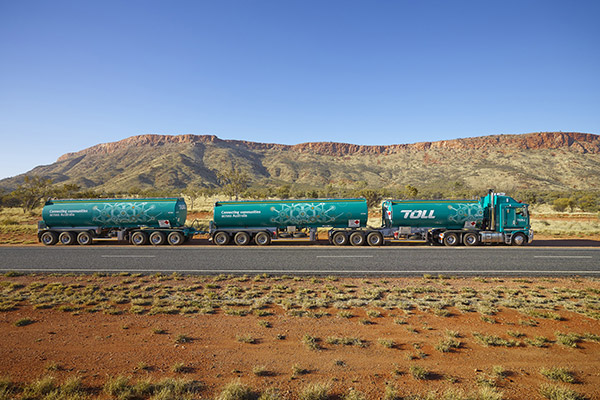Tougher COR, compulsory EWDs and more rest areas are amongst numerous measures Toll says will make the trucking industry safer
Trucking titan Toll has outlined key measures it says will save lives on Australian roads.
Toll’s Sarah Jones was speaking at the recent Australasian Road Safety Conference in Canberra, of which Toll was a major sponsor.
Operator licensing (see Monday’s story) was not the only touchy topic Jones raised amongst a list of proposed trucking industry reforms to improve safety. Others included compulsory electronic logbooks and tougher enforcement of the chain of responsibility.
Jones is a former head of compliance and technology with the National Transport Commission. She says there is “good evidence” the Heavy Vehicle National Law (HVNL) – with its concept of chain of responsibility – has made the roads safer.
For example, figures from the customer base of NTI (National Transport Insurance) indicate that major crashes have reduced at the same time as the freight carted has increased.
“However, despite these clear gains, the sobering fact remains there is no industry more dangerous for an Australian than transport,” says Jones – adding that’s when including vehicle accidents in agriculture and forestry.
“Arguably Australia has failed to keep pace with the United States and the United Kingdom in terms of on-road accidents involving freight.”
Get tougher on COR
Jones says there needs to be more enforcement of chain of responsibility.
“I know it sounds counter-intuitive to have someone from industry calling for more enforcement, but we want more enforcement.”
She referred to a now-infamous photo taken by NSW authorities of a small rectangle painted on the concrete at an unnamed distribution centre, which was supposed to be the driver’s “rest area” while they waited.
“This is just so egregiously wrong that when consignors and consignees won’t come to the party, we need enforcement mopping up, because if they don’t make these parties accountable, the capacity of the operators who do care, to remain viable, is radically reduced.”
Official silence
Jones says vital guidance about chain of responsibility is lacking. For example what are “reasonable steps” under chain of responsibility legislation?
Jones points out that the courts are the ultimate judge of this, but they don’t produce any systematic and frequent public reports.
To make matters worse, regulators don’t have information on court verdicts either.
“Currently, no regulator across the country is publishing these outcomes and advising us what reasonable steps are,” says Jones. “There’s a hunger for this information.”
More driver rest areas
“Picture this,” Jones asked the conference. “You are driving your heavy vehicle, you’re coming up for a required rest break. There are kilometres and kilometres of glaring asphalt coming up in front of you, no safe place to pull up, no toilet facilities and running water, no shade.
“What are your chances of having restorative rest in that environment?
“When I put the RIS (regulatory impact statement) for the HVNL together in 2012, we quoted Natroad to the effect that there is a deficit of 22,000 driver rest areas in this country.”
 |
|
What passes for a “driver rest area” in much of Australia.
|
Compulsory telematics
Toll is advocating that telematics be compulsory, including electronic logbooks.
Sarah Jones points out that telematics can measure speed, mass, driving hours, how the driver is performing, G force events, and adherence to correct routes.
“Why wouldn’t we utilise that data?” She asks. “To me the great advantage of this is that you can differentiate between an inadvertent mistake to which all human beings are prone, and those operators that are systematically, deliberately flouting the law for commercial gain.”
Sharing the road
As every truckie knows, many car drivers think it’s okay to run up on the inside as a truck is turning left, or to cut in front.
Jones referred to these stupid practices before showing a couple of videos from Toll truck dash cameras showing even more idiotic motorist behaviour.
She then made an incredible revelation: “At the moment there is no sharing the road campaign in any state-based road safety strategy.”
More carrots needed
 |
|
Toll’s head of compliance Sarah Jones in action at the Australasian Road safety conference. (Photo by Jennifer Nagy).
|
Jones calls for incentives to reward good operators.
“We already have systems across the country where if you have a clean license, you pay a reduced fee for that drivers license. Why not reduce registration for good operators?”
Toll also wants to see financial incentives for operators to buy equipment with the latest safety technology, for example trucks with autonomous emergency braking and trailers with electronic stability control.
It says that due to Australia’s relatively old truck fleet, when an ADR (Australian Design Rule) is introduced it can take 15 years to work its way through the heavy vehicle fleet.
“I would really like to see this idea of concessions and incentives available to industry to be deploying that kind of technology faster,” Jones says.
Driver fitness for duty
“I think we need more of a focus on the driver, not just the vehicle,” says Jones.
“There are issues around did you have enough sleep? What are your lifestyle choices? Are you exercising? Is there something on your mind? Have you got a mental health issue; are you experiencing a relationship breakdown?
“At Toll Group at the moment we have got a real campaign on around health and well-being, mental health and tackling the cultural issues that might make it very difficult for an overwhelmingly male workforce to disclose where there are issues that might be impacting their fitness for duty.”
Check out the full feature in the November issue of ATN. Subscribe here.


